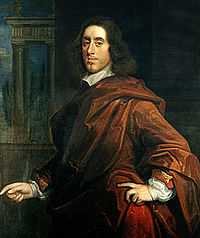Sir Harry Vane
| Sir Henry Vane the Younger | |
|---|---|

Portrait by Sir Peter Lely
|
|
| 6th Governor of the Massachusetts Bay Colony | |
|
In office 25 May 1636 – 17 May 1637 |
|
| Preceded by | John Haynes |
| Succeeded by | John Winthrop |
| Personal details | |
| Born | baptised 26 March 1613 Debden, Essex, England |
| Died | June 14, 1662 (aged 49) Tower Hill, London |
| Signature |  |
Sir Henry Vane (baptised 26 March 1613 – 14 June 1662), son of Henry Vane the Elder (often referred to as Harry Vane to distinguish him from his father), was an English politician, statesman, and colonial governor. He was briefly present in North America, serving one term as the Governor of the Massachusetts Bay Colony, and supported the creation of Roger Williams' Rhode Island Colony and Harvard College. A proponent of religious tolerance, he returned to England in 1637 following the Antinomian controversy that led to the banning of Anne Hutchinson from Massachusetts.
He was a leading Parliamentarian during the English Civil War and worked closely with Oliver Cromwell. He played no part in the execution of King Charles I, and refused to take oaths that expressed approval of the act. Vane served on the Council of State that functioned as the government executive during the Interregnum, but split with Cromwell over issues of governance and removed himself from power when Cromwell dissolved Parliament in 1653. He returned to power during the short-lived Commonwealth period in 1659–1660, and was arrested under orders from King Charles II following his restoration to the throne. After long debate, Vane was exempted from the Indemnity and Oblivion Act, and was thus denied amnesty granted to most people for their roles in the Civil War and Interregnum.
...
Wikipedia
